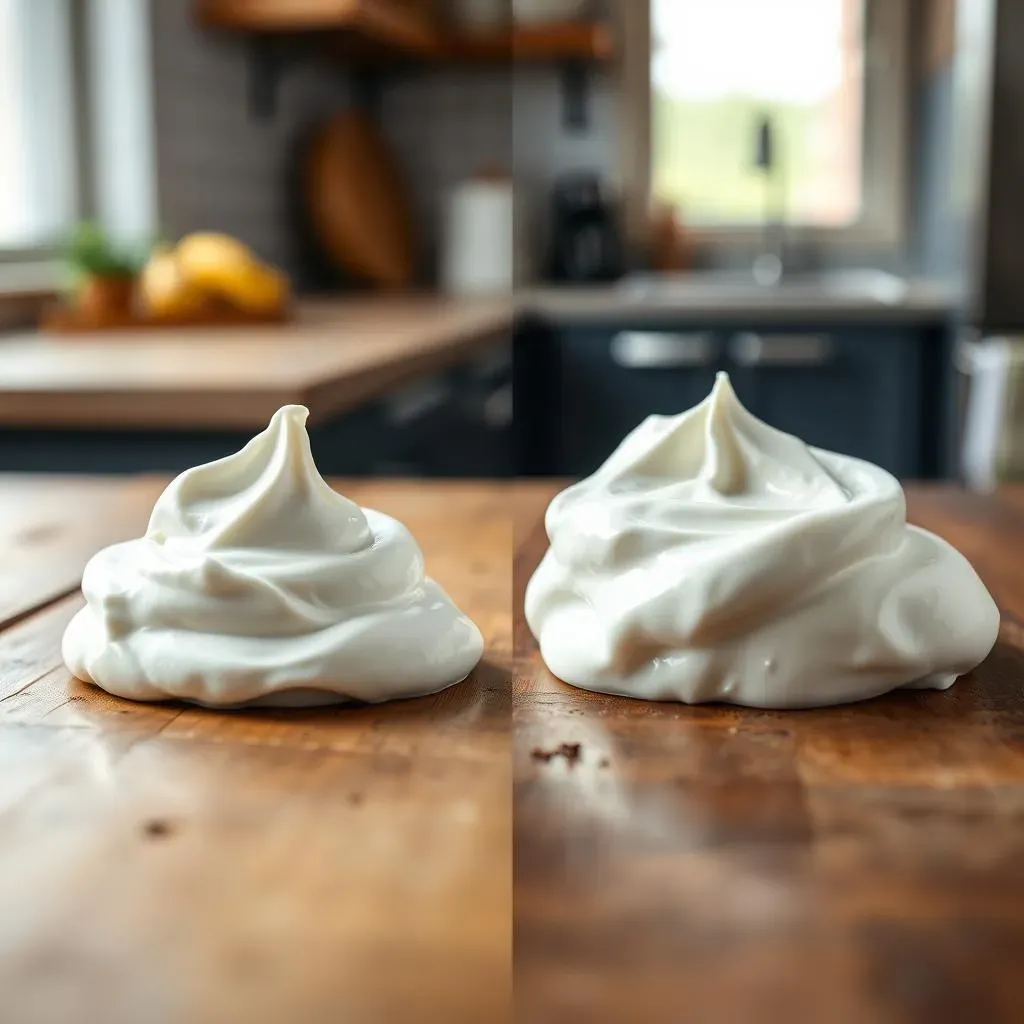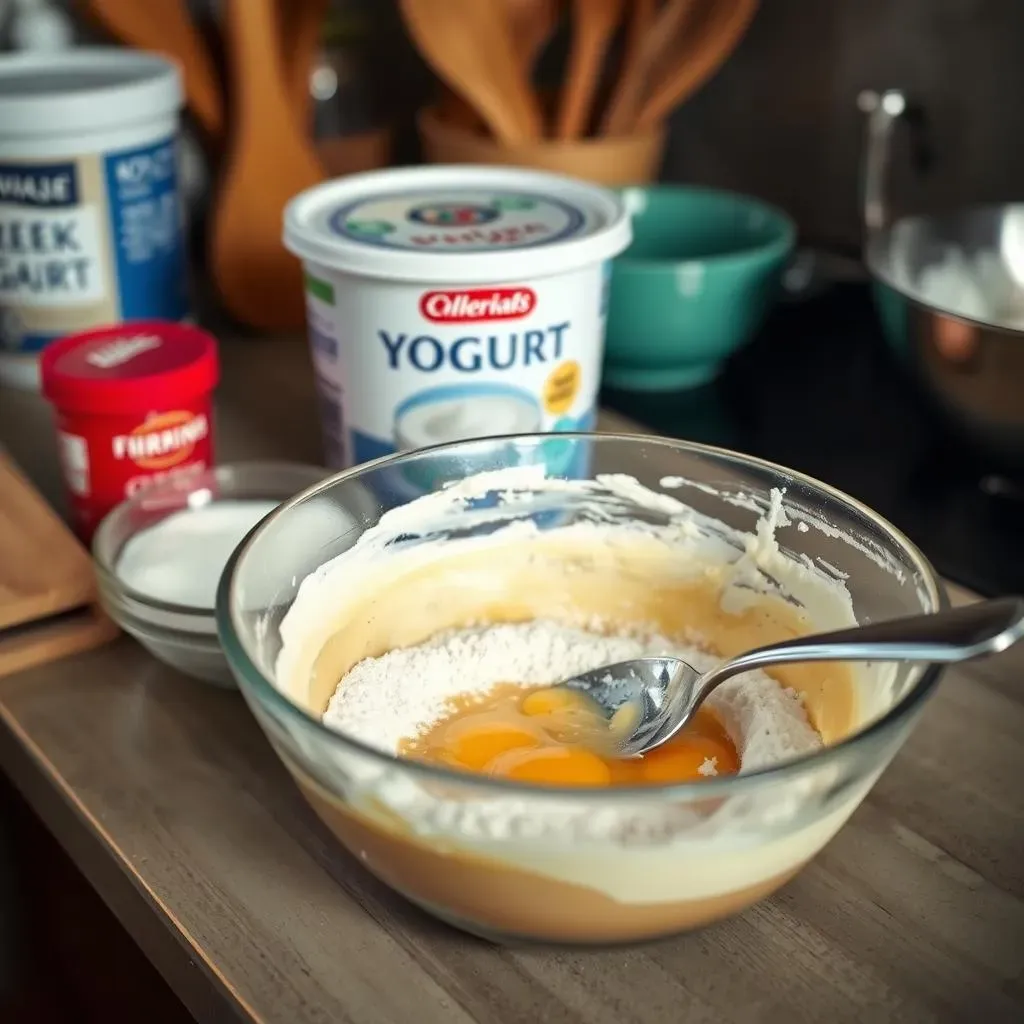Table of Contents
Ever stared blankly at a recipe, realizing you're missing a key ingredient—sour cream? Don't panic! This article tackles the burning question: "Can I substitute sour cream for Greek yogurt?" We'll explore the subtle yet significant differences between these two creamy dairy products. Understanding these differences is crucial for successful substitutions. We'll journey through various recipes, highlighting where a swap works wonders and where it might lead to culinary chaos. From baking to dips to more adventurous uses, we'll arm you with the knowledge to confidently substitute, creating delicious results every time. Get ready to unlock a world of culinary flexibility and discover creative ways to use both sour cream and Greek yogurt! Let's dive in!
Understanding the Differences: Sour Cream vs. Greek Yogurt

Understanding the Differences: Sour Cream vs. Greek Yogurt
Fat Content and Texture
Let's start with the basics: fat content. Sour cream is typically higher in fat than Greek yogurt, resulting in a richer, creamier texture. Think of it like this: sour cream is the luxurious velvet couch, while Greek yogurt is the sturdy, supportive armchair. This difference in fat impacts how they behave in recipes. For instance, in baking, the higher fat content of sour cream can lead to a more tender crumb, while Greek yogurt might result in a slightly drier product. If you're looking for a substitute for sour cream in mashed potatoes, you might want to consider other options, like sour cream alternatives for mashed potatoes, to maintain that creamy texture.
One thing to keep in mind is that the type of milk used also affects the final product. Whole milk sour cream will be richer than low-fat versions, and the same goes for Greek yogurt. Experimenting with different fat percentages can help you fine-tune your substitutions. Sometimes, a little experimentation is all you need to achieve a perfect match. If you want to make sure you're using the best possible substitute, you might also want to read about substituting heavy cream for sour cream.
Feature | Sour Cream | Greek Yogurt |
|---|---|---|
Fat Content | Higher | Lower |
Texture | Creamier, thicker | Thicker than regular yogurt, but less creamy than sour cream |
Tanginess | More pronounced | More subtle |
Flavor Profile and Acidity
Beyond texture, the flavor profiles differ. Sour cream boasts a sharper, more pronounced tang. Greek yogurt, while tangy, offers a milder, sometimes slightly sweeter taste. Think of it like comparing a sharp cheddar to a mild Monterey Jack. This difference is crucial when considering substitutions, especially in dishes where the sour cream's tang is a key element. For example, in a creamy tomato soup, the sharper tang of sour cream might be preferred, whereas the milder flavor of Greek yogurt could work better in a tzatziki sauce. If you're looking for a more detailed analysis of sour cream substitutes, check out our article on substituting sour cream for buttermilk.
The acidity levels also play a role. Sour cream is generally more acidic than Greek yogurt. This can affect how it interacts with other ingredients in a recipe, like leavening agents in baking. Sometimes, you might need to adjust other ingredients to compensate for the difference in acidity when swapping sour cream for Greek yogurt. For instance, if you are using Greek yogurt in baking, you might need to add a pinch of baking soda to counteract its lower acidity. If you're trying to replace sour cream with something else, you might find our guide on substituting ricotta for sour cream helpful.
- Consider the overall flavor profile of your dish.
- Adjust for acidity differences when substituting.
- Experiment to find what works best for you!
Swapping in Recipes: Successes and Potential Pitfalls

Swapping in Recipes: Successes and Potential Pitfalls
Baking Triumphs and Disasters
Let's talk baking! Greek yogurt can often be a surprisingly good swap for sour cream in cakes, muffins, and quick breads. Its thickness helps create a moist crumb, and the tang adds a nice subtle zing. However, remember that Greek yogurt is lower in fat, so your baked goods might be slightly less rich. You might need to adjust other ingredients – maybe add a little extra oil or butter to compensate. For instance, in a recipe for banana bread, using Greek yogurt instead of sour cream can produce a slightly drier result, although many find the substitution perfectly acceptable. For more ideas on using sour cream substitutes in baked goods, check out our guide on sour cream substitutes for banana bread.
But here's where it gets tricky: in recipes relying heavily on sour cream's acidity for leavening, like some types of pancakes or certain cheesecakes, the swap might not be ideal. Greek yogurt's lower acidity might lead to flatter, denser results. In these cases, you may want to consider alternatives or stick with the sour cream. For cheesecake specifically, you might find our guide on substituting heavy cream for sour cream in cheesecake useful.
Recipe Type | Greek Yogurt Success? | Considerations |
|---|---|---|
Cakes/Muffins | Often works well | May be slightly less rich |
Pancakes/Waffles | Potentially problematic | Acidity levels are crucial |
Cheesecake | Generally not recommended | Texture and tanginess are key |
Savory Successes and Sour Cream's Reign
Moving on to savory dishes, Greek yogurt can be a fantastic stand-in for sour cream in dips like tzatziki or in creamy sauces for tacos or enchiladas. Its thicker consistency prevents it from becoming watery, and the tang adds a refreshing element. However, in dishes where the sour cream's richness is a key component, such as certain potato salads, the substitution might not be as successful. You might consider other options, such as substituting heavy cream instead.
Remember, sour cream's higher fat content contributes to its creamy texture and mouthfeel. Greek yogurt, being lower in fat, can sometimes result in a thinner consistency in some savory dishes. This is especially true when it comes to things like creamy soups or sauces where the richness of the sour cream is a critical part of the recipe’s flavor profile. For a more comprehensive overview of sour cream substitutes, you might check out our ultimate guide on substituting ricotta for sour cream.
- Start with a 1:1 ratio for your substitution.
- Taste and adjust seasoning as needed.
- Consider the desired texture and flavor of your dish.
Beyond Baking and Dips: Creative Uses for Substitutions

Beyond Baking and Dips: Creative Uses for Substitutions
Beyond the Basics: Getting Creative
Let's move beyond the usual suspects—cakes and dips—and explore some unexpected uses for sour cream and Greek yogurt substitutions. Think marinades! Greek yogurt's tanginess can create surprisingly delicious marinades for chicken or fish, adding both flavor and moisture. The lower fat content means less greasy results on the grill. If you're looking for a tangy twist on your next barbecue, consider this a game-changer. Sour cream, on the other hand, can lend a rich, creamy base to certain sauces, adding depth and body. Consider using it as a base for a creamy mushroom sauce, for example.
Don't forget about adding a dollop of either to your favorite soups or stews for a boost of creaminess! A spoonful of Greek yogurt can lighten up a heavy stew, while sour cream can add a rich, decadent touch to a lighter tomato-based soup. The key is to understand the subtle flavor differences and use them to your advantage. To learn more about other ways to utilize sour cream, you might find our guide on sour cream substitutes for applesauce helpful.
- Experiment with marinades: Greek yogurt's tang adds a unique twist.
- Enhance soups and stews: Sour cream adds richness, Greek yogurt adds lightness.
- Create creamy sauces: Sour cream or Greek yogurt can be a base for various sauces.
Unexpected Twists: Beyond the Expected
Let's get really creative! Have you ever considered using Greek yogurt as a healthier alternative to mayonnaise in sandwiches or wraps? It adds a creamy texture and a slight tang without the heavy richness of mayonnaise. It's a simple swap that can significantly lighten up your lunch. Similarly, you can use sour cream as a base for a unique and flavorful potato salad, adding a touch of acidity that cuts through the richness of the potatoes. This will add another layer of flavor to your dish.
Think outside the box! Can you imagine using Greek yogurt as a secret weapon in your next batch of meatballs? It adds moisture and a subtle tang that enhances the flavor of the meat. Adding a dollop of sour cream to your next batch of tacos can also elevate your culinary experience. The possibilities are endless! You might also be interested in our guide on substituting sour cream for butter.
Ingredient | Sour Cream Use | Greek Yogurt Use |
|---|---|---|
Sandwiches/Wraps | Adds richness | Healthier mayonnaise alternative |
Meatballs | Not typically used | Adds moisture and tang |
Potato Salad | Adds creaminess and acidity | Can be used but might result in a less creamy texture |